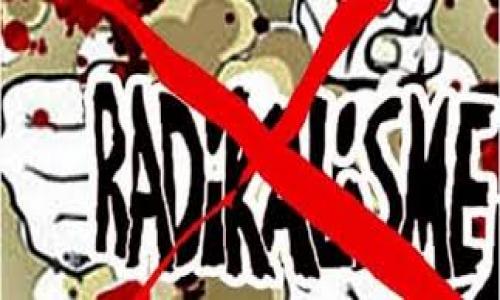Joint Efforts to Eradicate Radicalism
By: Aldia Putra )*
Radicalism ignores the most important messages of religions that teach nobleness and harmony. Radical understanding is also considered dangerous because it can create national disintegration. Therefore, the handling requires synergy not only by the Government, but also the community.
Radikali also threatens the unity of fellow citizens. It even damages the unity of fellow religious communities. This radical movement that can develop into terrorism teaches people to act violently, as if they are not human beings with hearts. They without looking directly destroy it. That is why in studying something we need to be careful and not be provoked.
Religious radicalism itself has actually existed since the 16th – 19th century AD.
But the phenomenon of religious radicalism does not only spread to Islam or Christianity. As written by Karen Armstrong in her book The Battle for God (2000), radicalism also exists in Hinduism and Judaism. Even the latest facts show the existence of radicalism in Buddhists.
This is certainly heartbreaking, but it is fitting to recognize that the religion that has been most corrupted by radicalism is Islam. Because it is not impossible if many people today think that radicalism is part of the teachings of Islam. Yet the reality is not like that.
That perspective appears clearly not without cause. As an advertisement that contains propaganda elements appears in various media, then it will gradually affect the mindset of the community as well. That is what happened to Islam.
Although Hizb ut-Tahrir Indonesia (HTI) has been officially disbanded and established as a forbidden organization by the government, in reality their movements still exist to spread their teachings such as radicalism through the kaffah bulletin. It is known that the kaffah bulettin is also distributed at Halim Perdana Kusuma Airport Mosque in Jakarta.
We certainly agree that the mosque is actually a place of prostration, praying in congregation and other worship activities that aim to get closer to God.
It’s just that the sacred building is often misused by groups with certain understandings. At the beginning of June 2018, Alissa Wahid launched a study that shocked the community, especially among Muslims. Where the survey shows that 40 mosques in Jakarta have been exposed to radicalism.
The phenomenon of mosques exposed to radicalism is also corroborated by research conducted by the Setara Institute. The Director of Research at the Equivalent Halili said, radicalism in Indonesia to the place of worship actually occurred as a legacy from regime change during the reform period. Post-reform there is a lack of clarity between the limits of freedom and the protection of public arenas from ideological infiltration.
In practice those who embrace radicalism tend to use violence. In Indonesia, this violence can be seen in various bombings and attacks on state symbols (one of which is the police). Symbols of capitalism such as entertainment venues and hotels are also referred to as one of the targets of frequent acts of violence because they see these things as not in accordance with the religious principles they believe.
The irony is, when the way the war is not possible to do then what happens is an act of terror. These acts of terror are the means by which they show the world that radicalism still exists and has never died. The danger is that they work in strong underground cells so that when one character dies, another character will replace him.
IPW Indonesia Police Watch said that radical groups as well as ex-terrorists can act and flourish among the euphoria of the election. Areas such as West Java, South Sulawesi, North Sumatra, West Sumatra, Central Java and Papua are strategic places for the birth of cell radicalism.
He claimed the radical groups were found in a number of areas, such as West Java and Riau. A number of money matters were reported to the president, namely a radical group who wanted to establish a country other than Islam and a number of BUMN and ASN officials who had radical ideology.
)* The author is a social political observer
